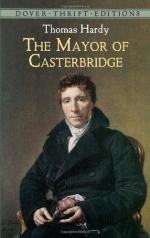Among the other papers had been placed the contents of his wife’s little desk, the keys of which had been handed to him at her request. Here was the letter addressed to him with the restriction, “Not to be opened till Elizabeth-Jane’s wedding-day.”
Mrs. Henchard, though more patient than her husband, had been no practical hand at anything. In sealing up the sheet, which was folded and tucked in without an envelope, in the old-fashioned way, she had overlaid the junction with a large mass of wax without the requisite under-touch of the same. The seal had cracked, and the letter was open. Henchard had no reason to suppose the restriction one of serious weight, and his feeling for his late wife had not been of the nature of deep respect. “Some trifling fancy or other of poor Susan’s, I suppose,” he said; and without curiosity he allowed his eyes to scan the letter:—
My dear Michael,—For the good of all three of us I have kept one thing a secret from you till now. I hope you will understand why; I think you will; though perhaps you may not forgive me. But, dear Michael, I have done it for the best. I shall be in my grave when you read this, and Elizabeth-Jane will have a home. Don’t curse me Mike—think of how I was situated. I can hardly write it, but here it is. Elizabeth-Jane is not your Elizabeth-Jane—the child who was in my arms when you sold me. No; she died three months after that, and this living one is my other husband’s. I christened her by the same name we had given to the first, and she filled up the ache I felt at the other’s loss. Michael, I am dying, and I might have held my tongue; but I could not. Tell her husband of this or not, as you may judge; and forgive, if you can, a woman you once deeply wronged, as she forgives you.
SUSAN HENCHARD
Her husband regarded the paper as if it were a window-pane through which he saw for miles. His lips twitched, and he seemed to compress his frame, as if to bear better. His usual habit was not to consider whether destiny were hard upon him or not—the shape of his ideals in cases of affliction being simply a moody “I am to suffer, I perceive.” “This much scourging, then, it is for me.” But now through his passionate head there stormed this thought—that the blasting disclosure was what he had deserved.
His wife’s extreme reluctance to have the girl’s name altered from Newson to Henchard was now accounted for fully. It furnished another illustration of that honesty in dishonesty which had characterized her in other things.
He remained unnerved and purposeless for near a couple of hours; till he suddenly said, “Ah—I wonder if it is true!”
He jumped up in an impulse, kicked off his slippers, and went with a candle to the door of Elizabeth-Jane’s room, where he put his ear to the keyhole and listened. She was breathing profoundly. Henchard softly turned the handle, entered, and shading the light, approached the bedside. Gradually bringing the light from behind a screening curtain he held it in such a manner that it fell slantwise on her face without shining on her eyes. He steadfastly regarded her features.




